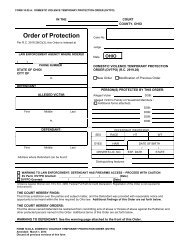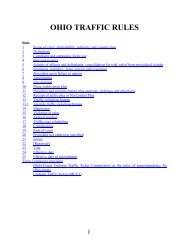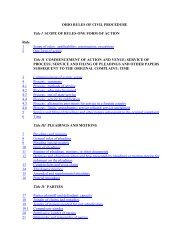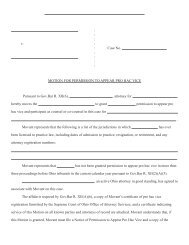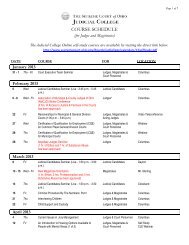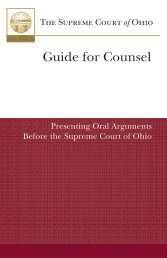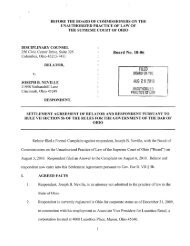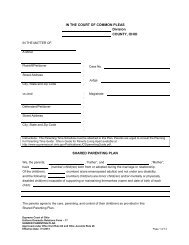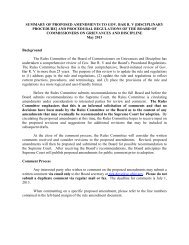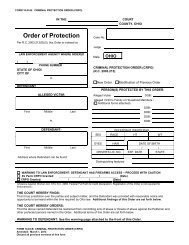disciplinary handbook: volume v - Supreme Court - State of Ohio
disciplinary handbook: volume v - Supreme Court - State of Ohio
disciplinary handbook: volume v - Supreme Court - State of Ohio
Create successful ePaper yourself
Turn your PDF publications into a flip-book with our unique Google optimized e-Paper software.
Willette, Columbus Bar Assn. v.117 <strong>Ohio</strong> St.3d 433, 2008-<strong>Ohio</strong>-1198. Decided 3/20/2008.Case Summaries- 352Respondent entered a contract with Estate Planning Legal Services, P.C. (―EPLS‖), a Michigan law firm to marketand sell living trusts and other estate-planning services in <strong>Ohio</strong>. The contract provided that EPLS would berespondent‘s sole and exclusive agent for marketing, sales, and preparing estate-planning packages. For any clientreferred by EPLS to respondent, respondent would pay EPLS the lesser <strong>of</strong> $750 or 50% <strong>of</strong> the client‘s fee as amarketing and document- preparation fee. EPLS prohibited respondent from <strong>of</strong>fering financial advice to hisclients as to funding <strong>of</strong> the trust. EPLS contacted prospective clients on respondent‘s behalf by direct mail andtelephone solicitation. EPLS touted the benefits <strong>of</strong> living trusts over probate. EPLS referred the consumers torespondent and a meeting would be arranged. In 2004, Janice Tolbert, an EPLS telemarketer contacted a couple (theTrotts). Later, respondent contacted the Trotts and identified himself as the attorney following up the phone call.He met with the Trotts and spoke favorably <strong>of</strong> living trusts and dangers and costs <strong>of</strong> probate. The Trotts agreed tohave respondent prepare a standard living trust for $1,500. He collected personal and financial information fromthem and without their knowledge or consent forwarded the information to EPLS. EPLS drafted the trustdocument and returned it to respondent. Respondent met with the Trotts to review and sign the document. Heinformed them they would need to meet another individual who would witness their signatures and explain thefunding <strong>of</strong> the trust. That individual, Larry Spencer, an agent <strong>of</strong> EPLS contacted them. Spencer was compensatedsolely by commissions on any insurance policies or annuities that he was able to sell to trust clients. After talkingwith Spencer, the Trotts became suspicious and filed a grievance. Board adopted the panel‘s findings,conclusions, and recommendations. Board found respondent violated DR 1-102(A)(4), 1-102(A)(6), 2-101(A), 2-101(F)(1), 2-103(B), 2-103(C), 3-102, 4-101, 5-101(A)(1), and 6-102. The Board did not find clear andconvincing evidence <strong>of</strong> a violation <strong>of</strong> DR 2-106. In aggravation, there were multiple violations, refusal toacknowledge fully the wrongful nature <strong>of</strong> the conduct, concealing <strong>of</strong> material information from the Trotts, and anattempt to return only a portion <strong>of</strong> the Trotts‘ fees in exchange for a full release. BCGD Proc.Reg. 10(B)(1)(b),(d), and (g). In mitigation, there was no prior discipline, there was cooperation and remorse for certain segments<strong>of</strong> the misconduct, and the eventual return <strong>of</strong> the entire fee, but the mitigating effect <strong>of</strong> the refund wasreduced because it occurred later in the grievance process. BCGD Proc.Reg 10(B)(2)(a), (c), (d). Boardrecommended suspension for one year, with six months stayed. Respondent did not object to the Board‘s findings<strong>of</strong> violations <strong>of</strong> DR 2-103(B), 2-103(C), 3-102, and 5-101(A)(1), but objected to the Board‘s findings <strong>of</strong> violations <strong>of</strong>DR 1-102(A)(4), 1-102(6), 2-101(F)(1), 4-101, and 6-102. The <strong>Supreme</strong> <strong>Court</strong> <strong>of</strong> <strong>Ohio</strong> adopted all <strong>of</strong> theBoard‘s findings. Respondent violated DR 2-103(B) by paying EPLS a fee for referring clients; DR 2-103(C)by using EPLS to market his services; DR 3-102 by paying EPLS 50% <strong>of</strong> the fees received from each clientreferred to him by EPLS; DR 5-101(A)(1) by failing to inform the Trotts <strong>of</strong> his business relationship with EPLS,including that he was obligated to use EPLS agents for trust-funding advice; DR 102(A)(4) by his misrepresentationby omissions in failing to inform Trotts <strong>of</strong> pertinent information such as he had a contract with EPLS, that he waspaying EPLS a portion <strong>of</strong> the fee he charged them; that he contract with EPLS required him to use EPLS fortrust-funding advice and document preparation, and by failing to advice them they could transfer their own assetsinto the trust rather than relay on financial advice from EPLS; DR 2-101(A) by not attempting to supervise orreview mailing by EPLS and continuing to use EPLS services even after he knew the marketing practices did notcomply with the rules; DR 2-101(F)(1) by EPLS solicitation <strong>of</strong> legal business by telephone; DR 4-101 by sharingTrotts‘ confidential information with EPLS without the clients‘ knowledge or express consent; DR 6-102 byrequesting a full release from the Trotts; DR 1-102(A)(6) by his inability to recognize the inherent conflict <strong>of</strong>interest between his business relationship with EPLS and his duty to the Trotts. The court adopted the Board‘srecommended sanction and so ordered a one-year suspension with six months stayed. Citation to Wheatley (2005).Rules Violated: DR 1-102(A)(4), 1-102(A)(6), 2-101(A), 2-101(F)(1), 2-103(B), 2-103(C), 3-102, 4-101, 5-101(A)(1), 6-102Aggravation: (b), (d), (g)Mitigation: (a), (c), (d)Prior Discipline: NO Procedure/ Process Issues: NO Criminal Conduct: NOPublic Official: NO Sanction: One-year suspension, 6 months stayed



